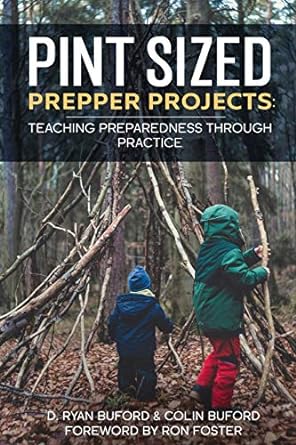[ARTICLE]: Herbal First Aid
Using plants for life's common mishaps is easy. Not only are the plants fairly common, gut within a small cluster of plants everyone can cover a tremendous range of real life situations. A naturopath, trying to point out that everything could not be would dial 911 and hope you would too. These remedies are for the life's bothersome, even painful incidents, but if the issue is life threatening, use good sense and get professional help.
Plantain
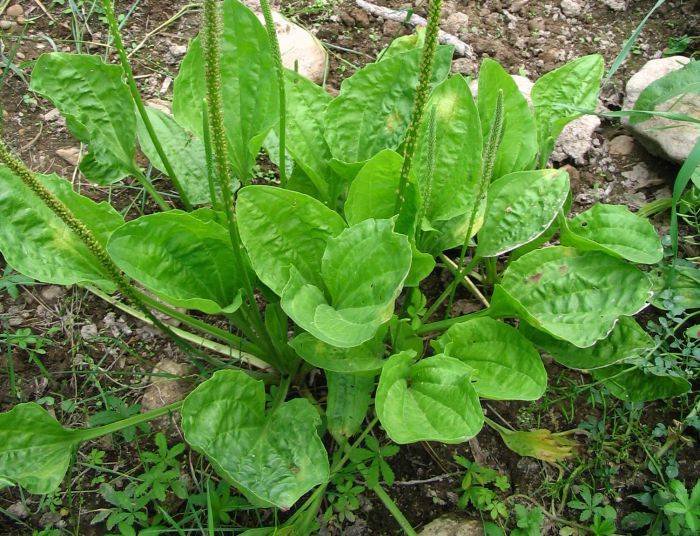 Plantain (Plantago major) is a common weed that grows in every lawn and sidewalk. The root of the plant name, plan, refers to the sole of the food because it grows everywhere we walk and pound down the soil. Learn to identify this plant. Anyone who knows a bit about plants can show you. Even in Minnesota this plant is available fresh and free eight months out of the year.
Plantain (Plantago major) is a common weed that grows in every lawn and sidewalk. The root of the plant name, plan, refers to the sole of the food because it grows everywhere we walk and pound down the soil. Learn to identify this plant. Anyone who knows a bit about plants can show you. Even in Minnesota this plant is available fresh and free eight months out of the year.
Take a fresh leaf, wipe off the dirt and chew the leaf lightly and apply to the skin like a band-aide. Maybe even tape it on. Plantain seems to be the strongest available drawing agent in the plant world. Use it to suck out dirt, shards of glass, splinters, pus, or anything embedded in your skin that doesn't belong there, including insect poisons from mosquitoes or bees. With splinters and glass the plantain pulls the substance far enough out that you can then remove it with tweezers.
Plantain is also analgesic [takes away pain], antibacterial, and stops itching, bleeding, and swelling. Consequently, plantain is best used for abrasions. This plant contains allantoin, which promotes new skin growth instantly, so if the wound involves stitches you may want to have stitches removed more quickly, as the plantain will encourage the skin to cover the stitches.
Yarrow
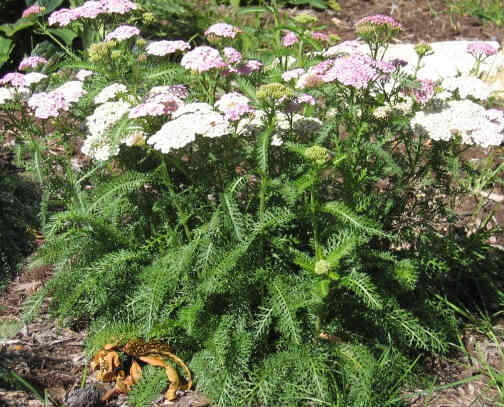 Sometimes the wound is much deeper. Yarrow (Achillea millefolium) applied topically [leaf or tincture] stops gushing blood. Its scientific name Achillea millefolium refers to its use by Achillies during the Trojan War to staunch the bleeding of his solder's wounds. Yarrow works extremely fast and thus should only be used on clean wounds. Otherwise, the dirt will be sealed inside and cause an infection. A nickname for yarrow was "nosebleed" because a leaf of yarrow stuck up the nose would cause a nosebleed.
Sometimes the wound is much deeper. Yarrow (Achillea millefolium) applied topically [leaf or tincture] stops gushing blood. Its scientific name Achillea millefolium refers to its use by Achillies during the Trojan War to staunch the bleeding of his solder's wounds. Yarrow works extremely fast and thus should only be used on clean wounds. Otherwise, the dirt will be sealed inside and cause an infection. A nickname for yarrow was "nosebleed" because a leaf of yarrow stuck up the nose would cause a nosebleed.
Hundreds of years ago it was believed that headaches were caused by too much blood congestion in the head and so herbalists too did a form of bloodletting. Herbs cause what they cure and cure what they cause. I have seen yarrow [tincture on a bit of tissue] stop very severe nosebleeds within ten seconds. Yarrow was also called "carpenter weed". Once again the name speaks of who would need it. Not only do carpenters commonly cut themselves, they also bruise themselves frequently.
Herbs have the ability to go either way and regulate the body. That is why yarrow is able to help blood both coagulate blood or break up the congealed blood of a bruise. It immediately kills the pain of an old bruise as it immediately takes away the pain as well and reverses the bruising process. Yarrow can also be used to stop internal hemorrhaging, including excessive menstrual fluid and blood in the urine or bowels (although once again, getting a medical opinion would not be a bad idea).
Furthermore, yarrow is also an excellent sunscreen (seems to be the highest SPF some of my very pale friends can find) and a very effective bug repellant (particularly mosquitoes). The U.S. military supposedly did studies and found yarrow to be more effective than DEET. For these purposes I use yarrow in ointment form.
Saint John's Wort
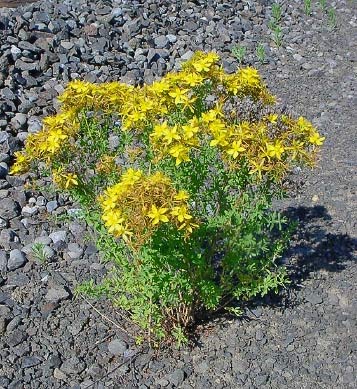 Saint John's Wort (Hypericum perforatum) ointment is a basic healing agent all of my friends and family keep at home or on trips. It is antibacterial and anti-inflammatory thus great for wounds of all sorts. The Anglo-Saxons brought yarrow and barrels of Saint John's Wort oil into war with them. It is also antiviral, thus useful for cold sores, genital herpes, and shingles. It is a great salve for unexplained rashes.
Saint John's Wort (Hypericum perforatum) ointment is a basic healing agent all of my friends and family keep at home or on trips. It is antibacterial and anti-inflammatory thus great for wounds of all sorts. The Anglo-Saxons brought yarrow and barrels of Saint John's Wort oil into war with them. It is also antiviral, thus useful for cold sores, genital herpes, and shingles. It is a great salve for unexplained rashes.
It is also a decent sunscreen, as well as a very good burn remedy (stove, sun, etc.). Frostbite responds to this salve as well. It soothes and restores damaged and irritated never endings. Thus it is useful sciatica, slipped disks, pinched nerves, teething pains, gum problems, and earaches, as well as the opposite; numbness. Saint John's Wort is also a muscle relaxant, thus useful for still muscles as well as menstrual cramps. As an added bonus I have seen it fade "liver spots" and made skin tags fall off, clearly an ointment to try on whatever ails you.
Arnica, False Soloman's Seal, Horsetail, & Boneset
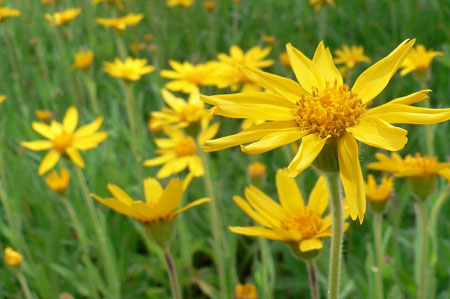 Arnica ointment is well known as a good basic remedy for musculo-skeletal problems such as muscle soreness as well as basic injuries such as strains and sprains. My basic philosophy as an herbalist is to use local plants and arnica comes from the mountains. Consequently I am partial to
Arnica ointment is well known as a good basic remedy for musculo-skeletal problems such as muscle soreness as well as basic injuries such as strains and sprains. My basic philosophy as an herbalist is to use local plants and arnica comes from the mountains. Consequently I am partial to 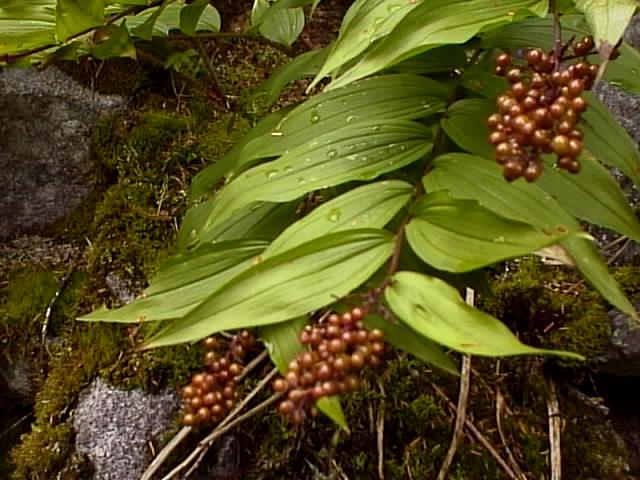
All of these grow locally and are fabulous troubleshooters for crushed bone, muscle tears and much more. Not only did these herbs take away the pain, the injuries healed so quickly I have been told the attending doctors then reneged on their previous diagnoses despite x-rays that showed fractures and bone chips. [picture to right is of False Soloman's Seal >> ] All of these herbs deserve a more thorough explanation of their healing properties, availability, preparation, and application but space is limited. Please feel free to call with questions.
Lise Wolff is a practicing herbalist with two offices in Minneapolis, Minnesota. She sees people for private consultations, sells herbs and teaches many classes. Call for more info at 612.819.9946 or visit my site at www.HerbalistLiseWolff.com
From A Handout for Herbal First Aid Class 2010 by by Herbalist Lise Wolff
Material and ©copyright 2010 Lise Wolff. All rights reserved.

